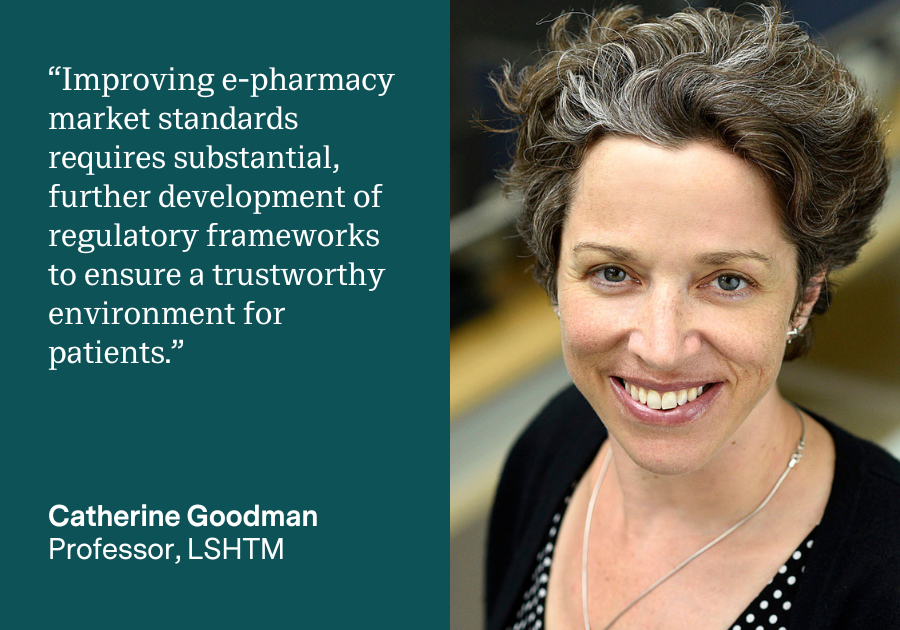
An analysis of regulatory compliance and best practices of e-pharmacies in India and Kenya offers new insights into how regulators can improve standards and therefore the quality and safety of consumer services.
E-pharmacies are websites that enable consumers to buy prescription medicines online and on mobile apps. Use has grown rapidly in low- and middle-income countries as many people in these settings face challenges in accessing essential medicine, and e-pharmacies provide an alternative and convenient purchasing platform. However, e-pharmacy growth has often outpaced the development of regulations, leading to concerns about consumer safety.
Catherine Goodman, Professor of Global Health & Development at the London School of Hygiene & Tropical Medicine (LSHTM), said: "Improving e-pharmacy markets performance and standards requires further substantial development of regulatory frameworks to ensure a trustworthy environment in which patients can confidently and safely access medications.”
Published in PLOS Global Public Health, the study involved researchers from The George Institute for Global Health in India, Strathmore Business School in Kenya, and LSHTM. The researchers analysed the characteristics and business practices of all e-pharmacy websites operating in both India and Kenya (61 and 26 respectively) in order to identify strengths and areas for improvement. The two countries were chosen for this study as they have contrasting regulatory environments; Kenya has a developed set of e-pharmacy rules, while India is yet to enact formal e-pharmacy regulations.
The researchers found that 90% of websites in India provided an option to upload prescriptions, but only 58% in Kenya, raising concerns that prescription regulations may be regularly violated, particularly in Kenya.
Other identified issues include inadequate provision of drug information. Only 16% of Indian e-pharmacies and 42% of Kenyan ones provided complete drug information on their websites such as side-effects and drug interactions.
The publication also found that 62% of websites in Kenya and 34% in India also listed narcotics or controlled substances for sale. This is despite their sale online being banned in Kenya, and widespread concerns about their availability online in both countries.
In both countries, compliance with best practices and regulations was better in high-traffic websites compared to those with relatively few visitors, and performance was also better for e-pharmacies located within the study country compared to those located outside. Based on this analysis, the authors have proposed a ‘risk-based’ approach, where regulators should:
- Engage constructively with relatively compliant e-pharmacies, creating opportunities to support best practice;
- Help partially compliant e-pharmacies to improve their operations;
- Aim to shut down the worst offenders, working with drug enforcement agencies, internet search partners, and regulators in other countries.
The researchers hope their findings can help inform the introduction of new regulations in India, which still lacks a specific regulatory framework for e-pharmacy, and help strengthen regulations in Kenya, ensuring safer and more reliable access to medicines for patients.
Dr Gautam Satheesh, Research Fellow at The George Institute for Global Health, said, “E-pharmacies have enormous scope to become a trusted source for patients, especially in countries such as India and Kenya, where access to high quality and affordable medicines remains a challenge for many. Our research provides a foundation for policymakers to develop regulations in India to govern the growth of e-pharmacies and safeguard consumers.”
Publication
Satheesh, G et al. The good, the bad, and the ugly: Compliance of e-pharmacies serving India and Kenya with regulatory requirements and best practices, PLOS Global Public Health. DOI: https://doi.org/10.1371/journal.pgph.0004202
If you enjoyed this article and would like to build a career in global health, we offer a range of MSc programmes covering health and data, infectious and tropical diseases, population health, and public health and policy.
Available on campus or online, including flexible study that works around your work and home life, be part of a global community at the UK's no.1 public health university.
